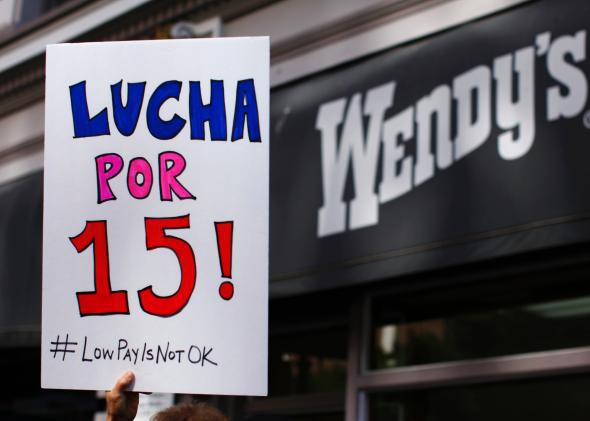First it was Seattle. Then came San Francisco. Now it’s Los Angeles. In a vote earlier today, lawmakers in L.A. moved toward adopting a $15 local minimum wage by 2020, setting it up to become the third major city to raise its pay floor to that level, and handing a major win to labor activists who had been lobbying for the hike.* This may be a sign that, much more than an experiment confined to the Pacific Northwest and Bay Area, the idea of a $15 minimum is “going mainstream,” at least in certain kinds of largely liberal coastal cities, as Paul Sonn, general counsel at the National Employment Law Project, told Al Jazeera America.
Which is worrisome.
Corporate interests and conservatives often whine that increasing the minimum wage will kill off jobs as employers choose to hire fewer workers. And typically, they’re exaggerating. While it’s not entirely conclusive, the economics literature suggests that moderately sized minimum wage increases lead to small, and possibly negligible, declines in employment, and that the benefits of higher pay for employees outweigh any damage that might be done. How come? Businesses usually find ways to adapt. They figure out how to make their workers more productive in order to justify their pay. Staff turnover decreases, which saves money. And, yes, prices go up a little. Your burger gets slightly more expensive, but the person grilling it gets a better standard of living.
But all of that past research doesn’t really tell us anything about what happens because of an increase along the lines of what Los Angeles is now poised to pass. Even supporters of a higher minimum wage acknowledge this, including the economists making sunny predictions about how a $15 minimum will create a powerful stimulus for the city’s economy (a dubious assertion for multiple reasons). As I’ve written before, Seattle basically decided to do the country a favor by turning itself into a Petri dish for a progressive minimum wage policy. But now, other cities are jumping on the bandwagon before we have any idea what the results of that big test will be.
Supporters of the Los Angeles City Council’s proposal say that workers need the hike because L.A. is a low-wage city with a high cost of living. The New York Times notes that as much as 40 percent of L.A.’s workforce may earn less than $15 per hour. But the fact that a metro area produces a dearth of well-paid work and is dominated by low-margin service businesses that might not have a lot of room to pay more (or raise their prices) is, in reality, a reason to be extra careful about pushing employers too far, too fast. One good rule of thumb developed by University of Massachusetts–Amherst economist Arindrajit Dube is that a reasonable minimum should be somewhere around 50 percent of the area’s median wage. Last year, Dube calculated that would be about $10.36 per hour in Los Angeles. By 2020, wage growth and inflation should still leave that figure under $12. (I’m assuming nominal 2.5 to 3 percent annual wage increases, which is higher than what we have now.) Fifteen is a leap.
The city council still has to vote on a final version of the ordinance, but at this point, it seems clear that the ordinance will eventually pass. And given the momentum of progressive politics, we probably shouldn’t be surprised if other big cities follow, ill-advisedly or not.
*Correction, May 19, 2015: This post originally misstated that Los Angeles had become the second major city to approve a $15 minimum. It is the third. San Francisco voters approved a referendum in November that would move it that high by 2018, which seems to have slipped my mind despite having reported it at the time.
